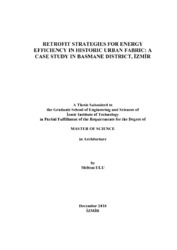Please use this identifier to cite or link to this item:
https://hdl.handle.net/11147/7190Full metadata record
| DC Field | Value | Language |
|---|---|---|
| dc.contributor.advisor | Durmuş Arsan, Zeynep | - |
| dc.contributor.author | Ulu, Meltem | - |
| dc.date.accessioned | 2019-07-17T11:18:07Z | |
| dc.date.available | 2019-07-17T11:18:07Z | |
| dc.date.issued | 2018-12 | - |
| dc.identifier.citation | Ulu, M. (2018). Retrofit strategies for energy efficiency in historic urban fabric: A case study in Basmane district, İzmir. Unpublished master's thesis, Izmir Institute of Technology, Izmir, Turkey. | en_US |
| dc.identifier.uri | https://hdl.handle.net/11147/7190 | - |
| dc.description | Thesis (Master)--Izmir Institute of Technology, Architecture, Izmir, 2018 | en_US |
| dc.description | Includes bibliographical references (leaves: 210-224) | en_US |
| dc.description | Text in English; Abstract: Turkish and English | en_US |
| dc.description.abstract | Energy efficient retrofit of historic urban stock requires a methodical approach, comprehensive analysis and case-specific solutions. In large scale rehabilitation projects, the retrofit strategy should be developed on how to decide solutions for buildings providing the most energy saving in a short time. This paper presents a pilot study conducted at the neighborhood scale, consisting of 22 pre- and early-republican residential and contemporary buildings in a historic urban fabric of İzmir, Turkey. It aims to develop an integrated approach to identify case-specific energy efficient solutions for retrofit strategy of larger scale historic district. It utilizes building performance simulation (BPS) model, created through the documentation and quick field survey. All case buildings are grouped under three main categories considering their heritage value and building characteristics. Two retrofit packages and three individual operational solutions are constituted by considering five-leveled retrofit impact assessment of the CEN EN 16883:2017 Standard. Within the integrated approach, energy classes of the buildings are calculated regarding Building Energy Regulation of Turkey. Most-related two design parameters, S/V and ground floor area to conditioned volume ratio, on annual energy consumption of the buildings in current cases are identified by Pearson correlation analysis. The simulation results indicated that, three buildings including Building 8, 11 and 21 representing each group can initially be retrofitted. Building 11 has the most energy saving potential through Package 2 in its own group. For all buildings, while maximum energy saving was provided by Package 2 with 48,57%, minimum energy saving obtained from Package 1 with 19,8%. | en_US |
| dc.description.abstract | Tarihi kentsel dokunun enerji etkin yenilemesi yöntemsel yaklaşım, kapsamlı analiz ve yere özel çözümler gerektirmektedir. Büyük ölçekli iyileştirme projelerinde, en fazla enerji korunumu sağlayacak yenileme kararlarının hangi binalarda, nasıl verileceği konusunda kısa zamanda yenileme stratejisi geliştirilmesi gerekmektedir. Bu tez, İzmir’in tarihi bir semtindeki Cumhuriyet öncesi, erken Cumhuriyet dönemi ve günümüz yapılarından 22 binayı kapsayan, komşuluk ölçeğindeki bir pilot çalışmadır. Bu çalışma, daha büyük ölçekteki tarihi bölgelerin retrofit stratejileri için alana özgü enerji etkin çözümleri belirlemede bütünleşik bir yaklaşım geliştirmeyi amaçlamaktadır. Çalışma, dokümantasyon ve hızlı saha araştırması ile oluşturulan bina enerji simulasyon (BES) modelinden faydalanmaktadır. Tüm çalışma binaları, yapıların karakter özellikleri ve mirasi değerleri düşünülerek üç ana grupta toplanmıştır. Toplam iki iyileştirme paketi ve üç bireysel operasyonel çözüm, CEN EN 16883:2017 standardının tarihi binalar için hazırladığı beş aşamalı iyileştirme etki değerlendirmesi dikkate alınarak oluşturulmuştur. Bütünleşik yaklaşım kapsamında, binaların energy sınıfları Türkiye’nin Bina Enerji Performansı Yönetmeliğine göre hesaplanmıştır. Binaların mevcut durumlarının enerji tüketimiyle en ilişkili olan iki parametre, A/V ve zemin taban alanının ısıtılan hacme oranı, Pearson katsayı analizi ile tanımlanmıştır. Simulasyon sonuçları her bir yapı grubunu temsil eden Bina 21, 8 ve 11’in öncelikli olarak iyileştirilebileceğini göstermiştir. Paket 2 ile Bina 11, kendi grubu içerisinde en yüksek enerji tasarrufu potansiyeline sahiptir. Tüm binalar için maksimum enerji tasaruffu ile %48,57 ile Paket 2 ile sağlanırken, minimum enerji tasarrufu %19,8 ile Paket 1’den elde edilmiştir. | en_US |
| dc.format.extent | xvii, 246 leaves | - |
| dc.language.iso | en | en_US |
| dc.publisher | Izmir Institute of Technology | en_US |
| dc.rights | info:eu-repo/semantics/openAccess | en_US |
| dc.subject | Energy efficient | en_US |
| dc.subject | Energy conservation | en_US |
| dc.subject | Building performance simulation | en_US |
| dc.subject | Basmane district | en_US |
| dc.title | Retrofit Strategies for Energy Efficiency in Historic Urban Fabric: a Case Study in Basmane District, Izmir | en_US |
| dc.title.alternative | Tarihi Kentsel Dokuda Enerji-etkin İyileştirme Stratejileri: İzmir, Basmane Semtinde Alan Çalışması | en_US |
| dc.type | Master Thesis | en_US |
| dc.institutionauthor | Ulu, Meltem | - |
| dc.department | Thesis (Master)--İzmir Institute of Technology, Architecture | en_US |
| dc.relation.publicationcategory | Tez | en_US |
| dc.identifier.wosquality | N/A | - |
| dc.identifier.scopusquality | N/A | - |
| item.openairecristype | http://purl.org/coar/resource_type/c_18cf | - |
| item.languageiso639-1 | en | - |
| item.openairetype | Master Thesis | - |
| item.grantfulltext | open | - |
| item.fulltext | With Fulltext | - |
| item.cerifentitytype | Publications | - |
| Appears in Collections: | Master Degree / Yüksek Lisans Tezleri | |
Files in This Item:
| File | Description | Size | Format | |
|---|---|---|---|---|
| T001870.pdf | MasterThesis | 22.74 MB | Adobe PDF |  View/Open |
CORE Recommender
Page view(s)
252
checked on Mar 31, 2025
Download(s)
392
checked on Mar 31, 2025
Google ScholarTM
Check
Items in GCRIS Repository are protected by copyright, with all rights reserved, unless otherwise indicated.